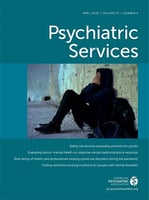Mental Health of Rural Veterans May Benefit From Use of Video-Enabled Tablets

Video-enabled tablets may help veterans with mental health conditions who live in rural areas access mental health care, a study in JAMA Network Open suggests. Veterans who received these tablets during the COVID-19 pandemic had increased video mental health service use, more psychotherapy visits, reduced suicidal behaviors, and fewer emergency department visits.
“These findings suggest that the VA and other health systems should consider leveraging video-enabled tablets for improving access to mental health care via telehealth and for preventing suicides among rural residents,” wrote Kritee Gujral, Ph.D., of the VA Palo Alto Health Care System and colleagues.
Gujral and colleagues analyzed data from approximately 472,000 rural veterans who had at least one VA mental health care visit in 2019, including a group of patients identified by the VA as having a high risk of suicide. Veterans were eligible to receive the VA’s video-enabled tablets with data plans if they did not own a device with broadband or cellular internet service, lived far from the VA or had another transportation challenge, and could operate a tablet, the researchers noted. The researchers compared monthly mental health service use for approximately 13,000 patients who received VA tablets between March 16, 2020, and April 30, 2021, with that of more than 458,000 patients who were not issued tablets; they specifically focused on the veterans’ mental health service use for the 10 months before and after the tablets were shipped.
Compared with patients who did not receive tablets, patients who received tablets had 1.8 more psychotherapy visits per year, 3.5 more video psychotherapy visits per year, and 0.7 video medication management visits per year. Patients who received tablets also experienced an overall 20% reduction in the likelihood of an emergency department visit, a 36% reduction in the likelihood of suicide-related emergency department visit, and a 22% reduction in the likelihood of suicidal behaviors. These associations persisted for the group of patients who were at high risk of suicide.
“These results reinforced a previous finding that tablets improved continuity of mental health care and extended prior work by showing tablet-associated reductions in [emergency department] visits and suicide behavior,” Gujral and colleagues concluded.
For related information, see the Psychiatric Services article “Increasing Mental Health Care Access, Continuity, and Efficiency for Veterans Through Telehealth With Video Tablets.”
(Image: iStock/Caiaimage/Sam Edwards)
Did You Fail to File Report on Provider Relief Funds You Received?
The Health Resources and Services Administration has announced that health care providers who received funds from the Provider Relief Fund program and did not submit their Reporting Period 1 report by the deadline may request to submit a late report, via a DocuSign form, if certain extenuating circumstances exist. The requests must be filed from Monday, April 11, to Friday, April 22, at 11:59 p.m. ET and must attest to a clear, concise explanation regarding the extenuating circumstance; no supporting documentation is required. Those whose request is approved will be notified to complete the Reporting Period 1 report within 10 days. Providers will also have an opportunity to submit a Request to Report Late Due to Extenuating Circumstances for Reporting Period 2. Notification regarding the process to submit the request will be announced in the coming weeks. For more information, call the Provider Support Line at (866) 569-3522; for TTY dial 711. Hours of operation are weekdays from 8 a.m. to 10 p.m. Central Time.





